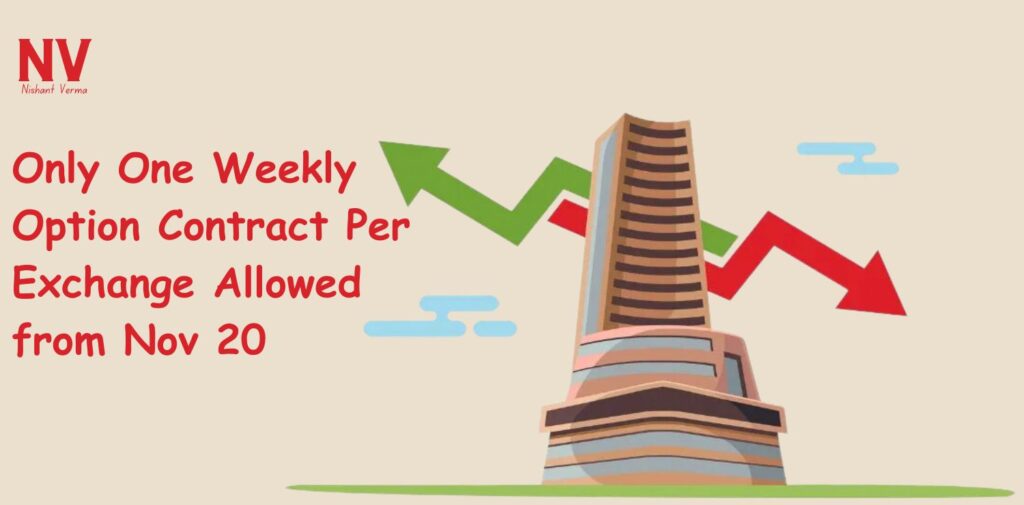The Securities and Exchange Board of India (SEBI) has recently introduced significant changes in the derivatives trading framework, limiting the weekly option contracts to one per exchange. This article will analyze the SEBI New Rules, their implications for the market participants, and the overall impact on the Indian financial ecosystem.
Overview of SEBI’s New Regulations
The primary change introduced by SEBI restricts the number of weekly option contracts to one per exchange. This means that from November 20, 2024, exchanges like the National Stock Exchange (NSE) and the Bombay Stock Exchange (BSE) will only be allowed to offer one weekly option contract each. Currently, NSE provides four weekly contracts, while BSE offers two. These exchanges will have to choose one index for the weekly expiry from the specified date.

Additionally, SEBI has revised the lot size of index derivatives. The notional value of the derivatives contract, which was previously set between ₹5 lakh and ₹10 lakh, has now been raised to ₹15 lakh to ₹20 lakh. This revision aims to reduce the frequency of small-ticket size trades that can lead to higher volatility.
Rationale Behind SEBI New Rules
SEBI’s decision to limit weekly option contracts is driven by several factors:
Curbing Excessive Speculation: Multiple weekly option contracts can lead to speculative trading, which increases market volatility. By restricting exchanges to one weekly contract, SEBI aims to reduce speculative tendencies and encourage more informed trading practices.
Protecting Retail Investors: The Indian derivatives market has seen a surge in retail participation, with many small investors engaging in F&O trading without a full understanding of the risks. The increase in lot size and the restriction on weekly options is intended to discourage uninformed retail participation and prevent potential financial losses.
Encouraging Long-Term Investments: SEBI wants to shift the focus from short-term trading strategies to long-term investment. By limiting the number of weekly expiries, the regulator hopes to reduce the attraction towards frequent trading and promote long-term financial planning.
Implications for Market Participants
The changes introduced by SEBI will have varying effects on different market participants, including retail investors, institutional investors, and brokerage firms.
Impact on Retail Investors: Retail investors are likely to be the most affected by these new rules. The restriction on weekly options and the increase in the notional value of contracts may make it more challenging for small investors to participate in the derivatives market. While SEBI’s intent is to protect them, the immediate impact could be a reduction in retail trading volumes.

Impact on Exchanges: Exchanges like NSE and BSE will need to reassess their offerings. Currently, NSE has a stronghold on weekly options trading with its multiple contracts. The new rule means both NSE and BSE need to select one index each for weekly expiries, which could impact the volumes and revenue generated from these contracts.
Impact on Institutional Investors: Institutional investors may benefit from reduced market noise due to less speculative retail activity. The increase in the notional value of contracts can ensure a higher barrier to entry, making it more suitable for larger players with significant capital.
Market Reactions and Future Outlook
The new regulations are expected to bring a mixed response from the market. While some players welcome the move as a step towards market stability, others view it as an unnecessary restriction that could stifle market liquidity.
Market Stability vs. Liquidity Concerns:
One of the primary arguments in favor of SEBI’s decision is that it will reduce excessive market speculation and ensure that only serious participants engage in weekly options trading. On the other hand, critics argue that reducing the number of weekly options could lower liquidity and make it difficult for investors to hedge their positions effectively.
Revenue Impact on Brokerage Firms:
Brokerage firms, especially those with a retail focus, may see a decline in their revenue from F&O trading due to reduced retail participation. Many brokerage houses derive a significant portion of their income from small-ticket size trades executed by retail investors.
Adjustments by Exchanges:
Exchanges will need to decide which index to prioritize for weekly options. Currently, the NSE dominates the options trading segment with its Nifty and Bank Nifty contracts. It is likely that NSE will retain one of these popular indices for weekly expiries, while BSE will need to consider choosing a different benchmark to differentiate itself.
Broader Impact on the Indian Financial Market
SEBI’s move is part of a broader effort to strengthen the regulatory framework governing the Indian financial markets. By limiting speculative trading and ensuring that only well-informed participants engage in derivatives trading, SEBI aims to create a more robust and resilient market structure.
Long-Term Investor Confidence: The new rules could bolster confidence among long-term investors. Reduced speculative activity means that the market is less prone to sudden swings driven by short-term bets, which can make it more attractive for long-term players.

Alignment with Global Standards: Globally, regulators have been tightening rules around derivatives trading to avoid excessive speculation. SEBI’s decision is in line with these global trends, ensuring that the Indian market remains aligned with international standards.
Encouraging More Informed Trading Practices: The increase in notional value for contracts and the restriction on weekly options will push traders to adopt more considered and informed strategies rather than engaging in high-frequency, high-risk trades.
Challenges and Criticisms
While SEBI’s move has clear benefits, it is not without challenges. Some of the key criticisms include:
Potential Decline in Market Liquidity: The reduction in the number of weekly options may lower overall trading volumes, impacting liquidity. This could make it difficult for participants to enter and exit positions seamlessly.
Increased Cost for Retail Participants: With higher notional values, the cost of participating in the derivatives market will go up. Retail investors who wish to hedge their portfolios may find it more expensive to do so under the new rules.
Limited Choices for Market Participants: By restricting the number of weekly options, SEBI may inadvertently limit the flexibility available to traders and investors. This could lead to a concentration of trading activity around fewer contracts, making it harder to achieve price discovery.
Conclusion
SEBI’s new regulations are a bold step towards creating a more stable and less speculative derivatives market in India. By limiting the number of weekly options contracts and increasing the notional value of index derivatives, SEBI aims to protect retail investors and encourage more prudent trading practices. While the immediate impact may include a reduction in liquidity and a decline in retail participation, the long-term benefits of a more stable and informed market could outweigh these concerns.
As these rules come into effect on November 20, 2024, it will be interesting to see how different market participants adapt to the changes and what strategies exchanges employ to maintain their competitiveness. The overall success of these regulations will depend on how well they balance market stability with maintaining a vibrant and liquid trading environment.




